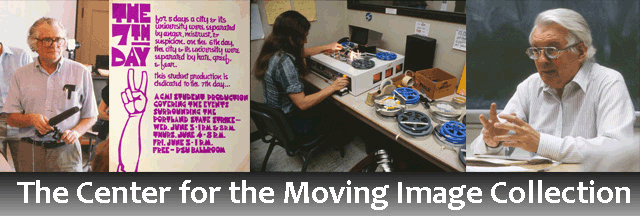Caprice Will Become the Rule
Document Type
Film
Publication Date
1969
Original Format
16mm
Rights
This digital access copy is made available as streaming media for personal, educational, and non-commercial use only. It cannot be reproduced in any form, distributed or screened for commercial purposes. It is made accessible because of one or more of the following situations: the rights are owned by State Board of Higher Education, on behalf of Portland State University; Portland State University has permission to make it accessible; it is made accessible for education and research purposes under "fair use" under U.S. Copyright law; or there are no known restrictions on use. In the event that previously unknown information is shared that may change the status of this item, it will be immediately removed from public view until pertinent rights issues are clarified. Contact Special Collections at Portland State University Library at: specialcollections@pdx.edu or (503) 725-9883.
Abstract
Between May 12th and 15th, 1969, the Center for the Moving Image at Portland State University recorded the Group for New Music's rehearsals of composer William Albright's "Beulahland Rag," in anticipation of their performance of the piece on the evening of May 15th. The resulting short film, "Caprice Will Become the Rule," described in the titles as a "filmic interpretation" of the rehearsals, documents the group's ambitious undertaking of this piece of modern composition.
Description
"Beulahland Rag" was conceived as a multi-media performance, involving live musical performance, taped sounds, films, narration, and vocal sounds such as laughter and whispers. The piece gradually builds into a cacophony with musical improvisation along the way. In "Caprice Will Become the Rule," conductor David Bloch leads players as they intersperse their various musical parts and vocal contributions.
The Group for New Music performed "Beulahland Rag" on May 15th, 1969, alongside another Albright piece, "Grand Sonata in Rag," as their final offering of the season to an audience of over three hundred in the Old Main auditorium (now Lincoln Hall) at Portland State. The final performance, however, was hindered by an incident just prior to show time. A thousand dollars' worth of equipment was stolen from the stage, and film, tapes, and projectors required for the multi-media component of the piece were sabotaged. Technicians were able to get only a portion of the gear in working order before the start time.
Despite the near-disaster, the piece was well received. In his enthusiastic May 21st review, "Vanguard" entertainment editor Dwight Gruber described the performance as "a truly unified piece," concluding, "Beulahland was great. It's too bad the whole thing wasn't operating; the work would have been overwhelming. Maybe they will do it again soon."
Group for New Music Credits:
Gerard Wolfert -- speaker
Frank Elliot -- saxophone
John Weinstein -- bass
Lee Rocky -- drums
Jack Howell -- piano
Jerry Morgan -- speaker
Sydney Hodkinson -- saxophone
Peter Langston -- electric guitar
Howard Hersh -- vibraphone
Jesse Kregal -- percussion
David Bloch -- piano & conductor
Center for the Moving Image Credits:
Film by Tom Taylor III, Bob Summers, Tjerk Dusseldorp, Doug Fellman, Gene Alicki
Titles by Jim Blashfield
(Research by Meg Langford)
Persistent Identifier
http://archives.pdx.edu/ds/psu/10698
Recommended Citation
Portland State University, "Caprice Will Become the Rule" (1969). Selections from the Center for the Moving Image Film Collection. http://archives.pdx.edu/ds/psu/10698



Related Resource
Gruber, Dwight. "'Beulahland', Sonata are delightful rags." Portland State University Vanguard, Vol. 24, No. 31, May 21, 1969.
Caprice Will Become the Rule. 16mm-DVD transfer. Portland State University Center for the Moving Image. 1969; Portland: 2014.